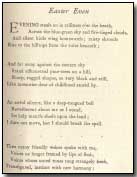Prose & Poetry - The Muse in Arms - Easter Even
 First published in London
in November 1917 and reprinted in February 1918 The Muse in Arms
comprised, in the words of editor E. B. Osborne:
First published in London
in November 1917 and reprinted in February 1918 The Muse in Arms
comprised, in the words of editor E. B. Osborne:
"A collection of war poems, for the most part written in the field of action, by seamen, soldiers, and flying men who are serving, or have served, in the Great War".
Below is one of seven poems featured within The Ghostly Company section of the collection.
You can access other poems within the section via the sidebar to the right.
Easter Even
by Dynely Hussey
Evening steals on in
stillness o'er the heath,
Across the blue-green sky and fire-tinged clouds,
And silent birds wing homewards; misty shrouds
Rise to the hilltops from the vales beneath;
And far away against the
eastern sky
Stand silhouetted pine-trees on a hill,
Sharp, rugged shapes, so very black and still,
Like memories dear of childhood stored by.
An awful silence, like a
deep-tongued bell
Reverberent about me as I stand,
Its holy mantle sheds upon the land;
I dare not move, lest I should break the spell.
Then many friendly voices
spake with me,
Voices no longer framed by lips of flesh,
Voices whose noted tones rang strangely fresh,
Transfigured, instinct with new harmony:
And I did weep to think that
these had died,
That I should hold no more their clasping hands,
Which now are blent with dust of foreign lands;
"But mourn not us; we are content," they cried;
"Rejoicing we went forth,
and loud in song,
Ready to suffer all things, or to die
If Fate so willed it; but our hopes were high;
We went forth steadfast to our will and strong.
"And some of us return not,
but remain
In close-dug graves o'ergrown with simple flowers,
Tended by gentle winds, washed with soft showers,
Lulled on earth's bosom to forget our pain.
"But comfort these, and on
their foreheads lay
Cool hands of consolation, that they sleep,
And so forget the cause for which they weep
In happy dreamlessness until the day."
Then I saw many mothers
grieving sore,
With sad, bowed heads, hot eyes devoid of tears;
Some young, unblemished, some grown grey with years,
Lone mothers mourning for the sons they bore.
But they were bravely
desolate; to speak
Soft words of comfort, hopeful of relief
Seemed but an insult to their quiet grief;
In face of such a sorrow words are weak.
"Yet this, O mothers, take
for comforting
We suffer and not they; the glorious dead
Are now at peace from Hate and Fear," I said;
"That day they died, they vanquished suffering.
"Therefore rejoice with
them; for not in vain
They gave the virgin glory of their youth,
That evil should not overcome, that truth
Might not be trampled for a tyrant's gain."
Then in the air about me
ever close
Strange Things unheard, impalpable, unseen,
Dimly perceived, danced statelily between
Heaven and earth; and a great tumult rose,
The rushing horror of a
thousand wings,
And intermingling voices of sweet praise,
Of men rejoicing, that had trod the ways
Of terror, and triumphant faced Death's stings.
And all those mourners, that
were on the earth,
Raised suppliant arms as o'er a sacrifice,
And with brave eyes exultant gave the price
Of victory - the sons they brought to birth.
Then suddenly the sudden
voices cease,
And high above shines out the evening star,
Shedding its ray of love and hope afar,
And on the stricken earth descendeth peace.
A bunker comprised a fortification largely built below ground level.
- Did you know?
